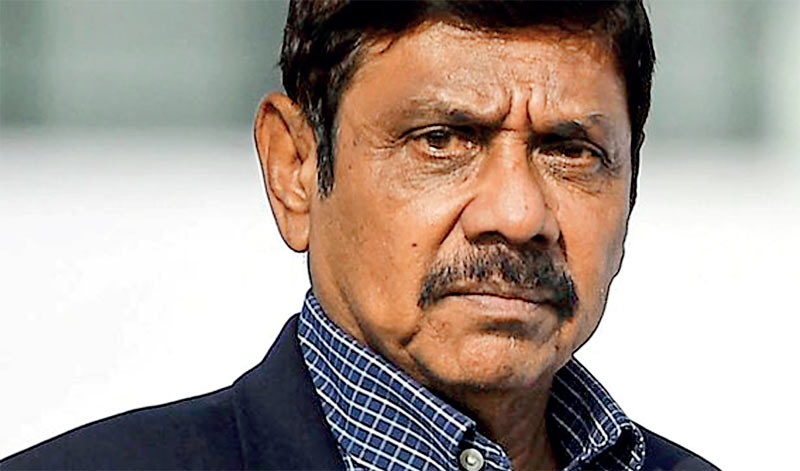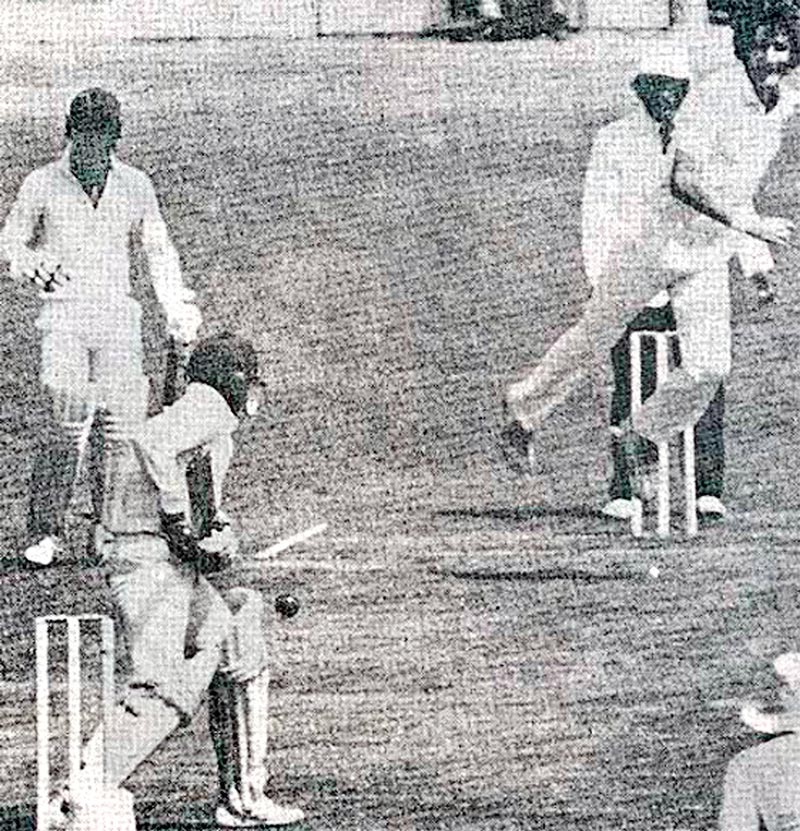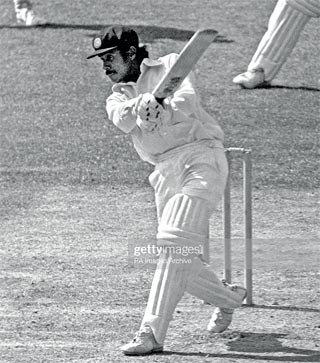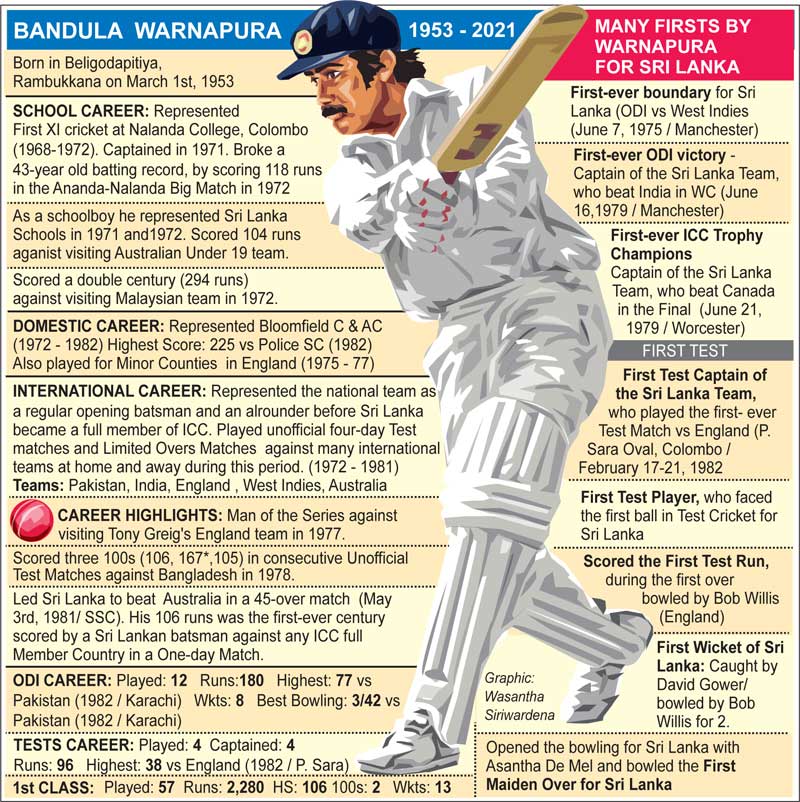Sunday Feb 22, 2026
Sunday Feb 22, 2026
Thursday, 21 October 2021 00:24 - - {{hitsCtrl.values.hits}}

Bandula Warnapura
By Sa’adi Thawfeeq
 |
| Warnapura faced the first ball for Sri Lanka in Test cricket bowled by England’s Bob Willis in 1982. The non-striker is Sidath Wettimuny |
 |
| Warnapura was a very good player of pace until he was hit on the head by Sylvester Clarke
|
The cricket world has been left deeply saddened by the demise of Bandula Warnapura, Sri Lanka’s first Test captain who died at the age of 68 from a heart attack while he was being treated at a private hospital for a sugar related problem resulting in the amputation of his right leg below the knee. Warnapura’s funeral took place at the Borella cemetery on Tuesday amidst a gathering of former national cricketers and colleagues.
To actually know the inside of this fine cricketer who also served as an administrator at Sri Lanka Cricket (SLC) and as development manager of the Asian Cricket Council (ACC) and the International Cricket Council (ICC) the Daily FT spoke to Sidath Wettimuny, his opening partner in the first Test against England in 1982, Ashantha de Mel with whom Warnapura opened the bowling in that Test, the two spinners from Warnapura’s club Bloomfield Ajith de Silva and Lalith Kaluperuma who formed the spin combination along with D.S. de Silva in that first Test and Jayantha Seneviratne who was associated with Warnapura since his childhood at Nalanda College, Bloomfield and Sri Lanka. What was common from what they had to say was that Warnapura was a players’ captain always willing to help them.
Sidath Wettimuny said: “He was in fact my first captain on my first international tour for the Gopalan trophy in 1975-6. I was the baby of the team and he was very supportive, he asked where I wanted to field and he made me feel very comfortable. In the 1970s when Tony Greig came here, in a radio interview he said Bandula was the best opener next to Sunil Gavaskar he had seen from the two countries.
“But once he got hit on the head by West Indian speedster Sylvester Clarke during a Sri Lanka Board President’s XI game at Galle in 1979, the blow changed his game completely. There were no sight screens on the ramparts and it was evening and the ball hit him at lightning speed. He was unconscious for six hours. He was a very good player of pace but after he got hit his game changed and understandably he was never the same player.
“The mere fact that he lived after that was a shock. He was a tough guy so he came out of it. By the time we went into Test cricket, that blow was beginning to affect him. Before he was hit he was fantastic. He was a very good captain and supportive of the players. He was straight talking, tough and forthright and he said what he had to say, but was very easy to get along with.”
Ashantha De Mel said: “A very nice guy, good captain and my first captain. By the time I started playing he was already a household name. He had a beautiful technique not like today’s players who are just power hitters. I remember against Bangladesh before we got Test status he made a huge amount of runs. Against Australia in a one-day international at the SSC, I remember he and Sidath (Wettimuny) had an opening stand of 170 and we won by six wickets (Warnapura, captaining Sri Lanka scored a century – 106).
“In the first Test match against England he was my bowling partner. We had only one fast bowler so he bowled from the other end. We had some good fond memories of the cricket we played, he was playing for Bloomfield and me, for SSC. The games were highly competitive. I got on very well with him even after he retired from cricket.”
Lalith Kaluperuma said: “He was a good captain, a good reader of the game who always looked after the players’ welfare. He was always for the players he played for Nalanda and Bloomfield. We won several trophies under his captaincy for Bloomfield. More than cricket he was looking after players’ benefits. Every player gave him 100 percent when they played under him.”
Ajith De Silva said: “I first met Bandu in 1969 when I was selected to tour India with the Ceylon Schools team captained by Mithra Wettimuny. I was a student of Dharmasoka, Ambalangoda. I lived in Dehiwala and Bandu in Wellawatte. We were asked to come for practices at the Sports Ministry grounds which I did not know about but Bandu came to my help and told me to come near the Savoy cinema and from there he took me to the practice venue.
“He used to pick me up and we travelled together by bus and returned the same way. I did well on the tour and after returning I got an offer to play for Ananda College. In the meantime, we had gone on tours to Pakistan and India and I also joined NCC. Someone told me to join Bandu’s club Bloomfield.
“But Bandu cautioned me and told me that although I was a Sri Lankan player he cannot ensure a place for me in the club team because there was another left-arm spinner Rohan de S. Wijeyeratne and that I will have to fight for a place with him. When I started to perform consistently for Bloomfield, Rohan quietly moved to Tamil Union. From there onwards I played under Bandu until we went to South Africa and got banned. He was a very honest captain. To me Bandu was like a God.”
Jayantha Seneviratne said: “I have been associated with Bandu since childhood. I played with Bandu in 1965 in the under-13 team for Nalanda College and from there in all age groups. We played together in the first eleven team for three years and we worked at the Wellawatte Spinning and Weaving Mills also together. At Bloomfield, the only club Bandu played throughout his career, he played for 15 years.
“He was one of the best captains I’ve ever seen because when he was playing for Sri Lanka he led them very well and for Bloomfield he has won us many trophies. He had so many plans to develop the club but due to COVID-19 he couldn’t do anything big. He was a very good captain, good team mate and he could get players together. He was a jovial type of person.”
International Cricket Council (ICC) Acting Chief Executive Geoff Allardice also said: “We are deeply saddened to hear the passing of Bandula, he achieved many things in cricket, not just as his time as Sri Lanka captain, but also as a former colleague at the ICC. His service to the game in Asia cannot be underestimated, our thoughts are with his family and friends at this time.”
Warnapura’s wife Hemamali, daughter Geethani and sons Madura and Madawa and grandchildren survive him.

